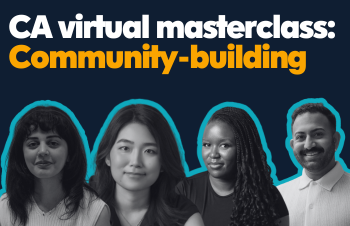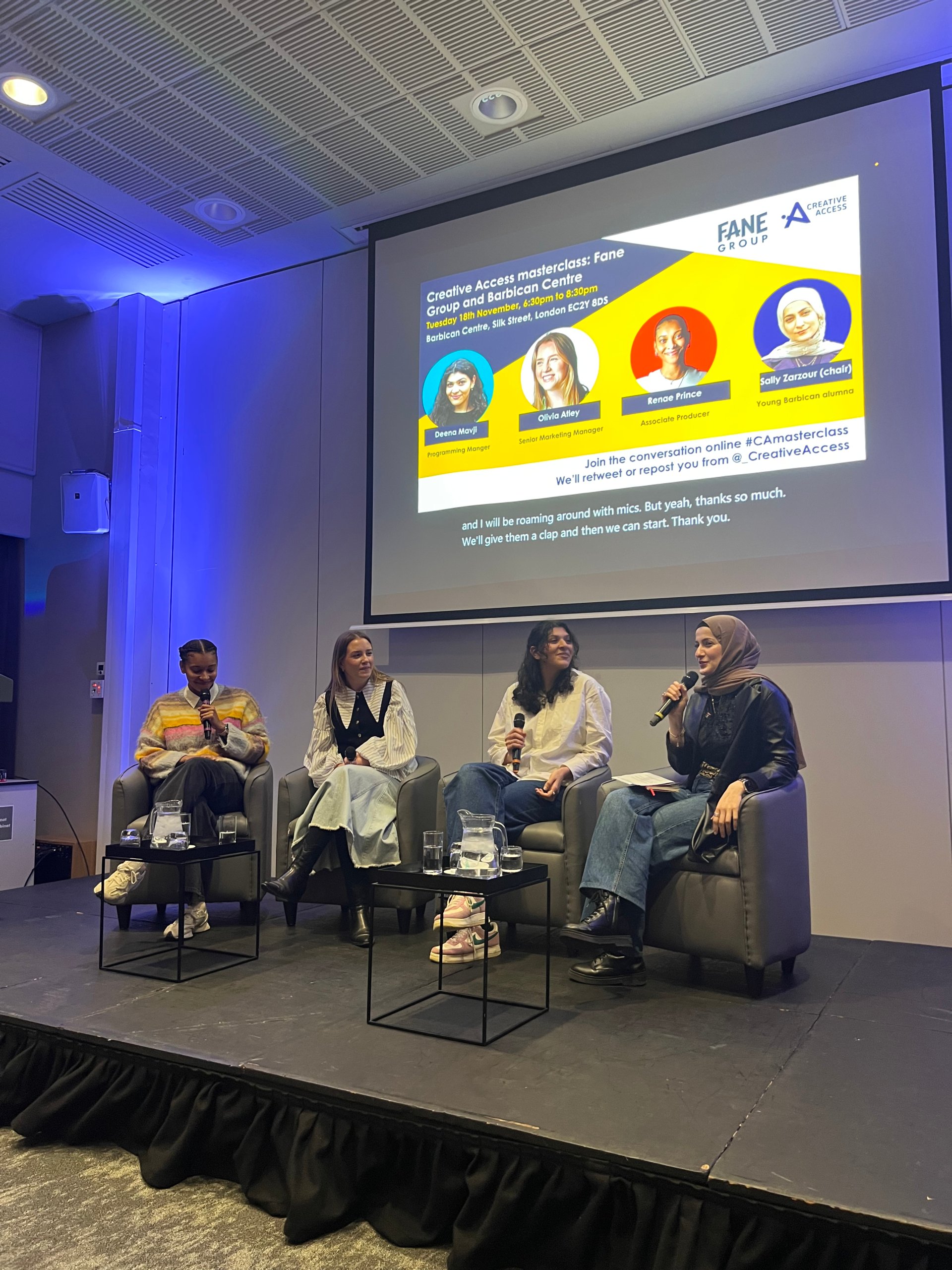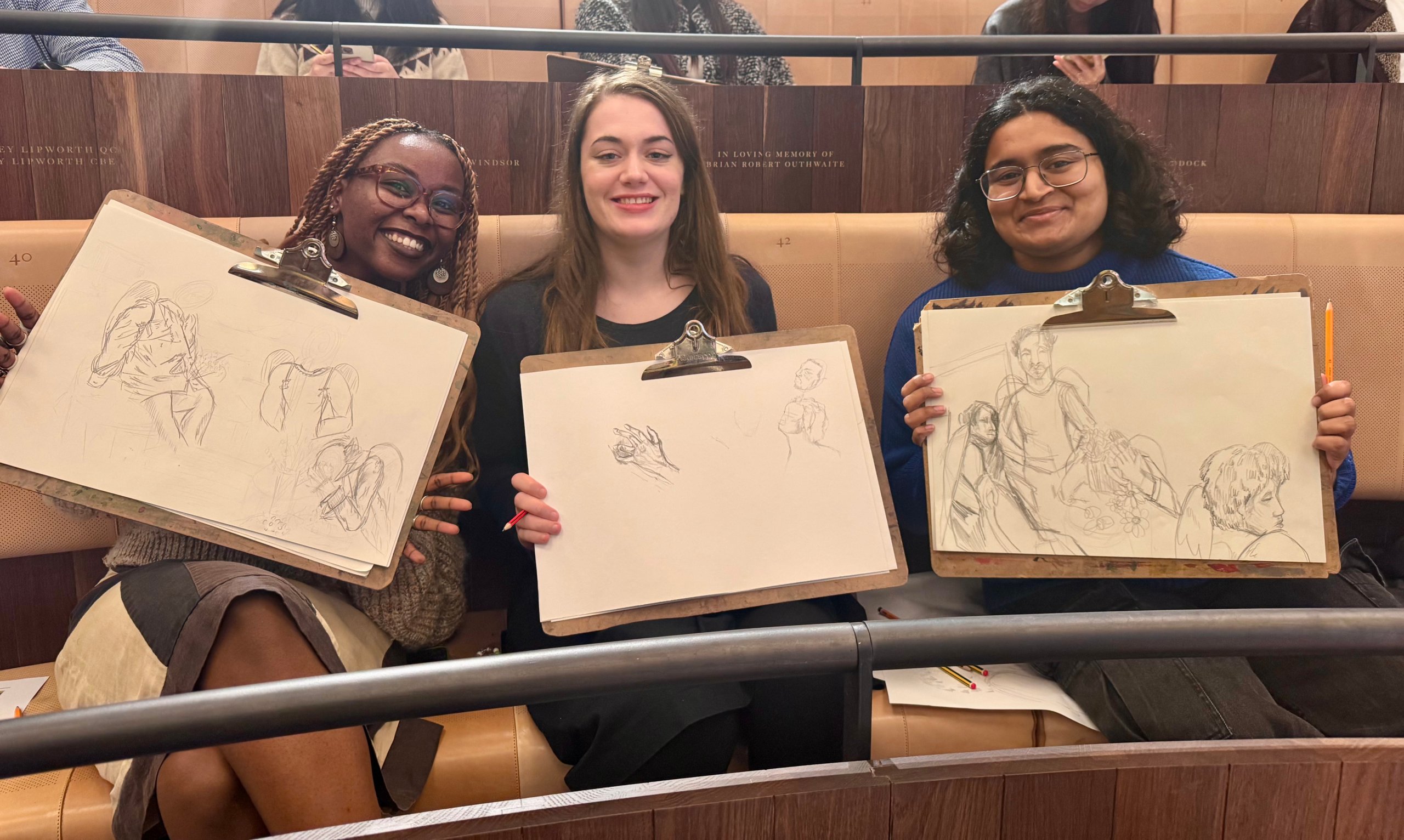Wonder what it’s like working for a major label representing the likes of Burna Boy, Fred Again and Dua Lipa? At our latest masterclass, the Creative Access community headed down to Warner Music UK’s offices for an energising panel exploring the many routes into the music industry – and the stories behind the people who’ve carved out careers across A&R, creative direction, sync, strategy, and brand partnerships.
With representatives from Warner Records, Warner Classics, Warner Chappell and WMX, the panel was packed with practical insights and real talk about how to find your voice, own your identity, and thrive in a fast-paced, ever-evolving creative space.
- Femi Bello – creative director, Warner Records
- Jonathan Farmer – senior manager, music artist & brand partners, WMX
- Thomas Horley – creative sync & marketing director, Warner Chappell Music
- Kara Mukerjee, strategy & innovation, Warner Classics
- Emily Green (host) director, A&R and catalogue, Warner Chappell UK
“Put yourself out there – and keep showing up”
For many of the panellists, breaking into music wasn’t linear – it took resilience, side-hustles, and a lot of DMs.
Femi Bello, now creative director at Warner Records, began her creative career directing a friend’s music video “by accident” and quickly realised she was more excited by this world than the path she’d set out on at university. “Where I’m from, there weren’t opportunities like this,” she said. “I left university after my first year when I realised I didn’t want to be stuck in a 9 – 5 I didn’t love.”
“I was hustling, sending 20 DMs a day during the pandemic. That’s how I got an internship,” she added. “Look at your interests and what sets your heart on fire. It’s okay if it’s not cohesive – find the thing that excites you.”
For Thomas Horley, now director of creative sync & marketing at Warner Chappell Music, getting his foot in the door meant saying yes to everything. “Every job I’ve ever had, I was already doing it three months before.”
He added, “Put yourself out there. Sometimes in this industry, you have to use a machine gun to swat a fly – show your passion and your instinct.”
Finding your voice – and protecting it
The panellists spoke candidly about how crucial it is for artists and execs alike to understand who they are, and what they stand for – particularly in an industry that can blur the lines between identity and commerce.
Jonathan Farmer, senior manager of artist & brand partnerships at WMX, emphasised the importance of authenticity when it comes to brand collaborations: “If an artist doesn’t know who they are, it can be easy to be misled by money. If the brand and artist aren’t aligned, the partnership won’t work – especially now, with Gen Z audiences being so switched-on to what’s real.”
Femi agreed: “Creative direction is being the eye to the ear. Sometimes it’s like being a psychologist: listening, figuring out the truth, and helping to build a strategy that feels authentic.”
Inclusion that goes beyond the buzzwords
The panel also reflected on what meaningful inclusion looks like within the music industry – and the efforts being made within Warner to foster long-term, systemic change.
“There’s no one person who can represent everyone in the UK,” said Emily Green, director of A&R and catalogue at Warner Chappell. “We need a huge array of people and identities in this industry.”
Warner’s employee resource groups (ERGs) offer safe, collaborative spaces for marginalised groups. As Jonathan, who co-chairs the Kinfolk ERG for Black staff, put it: “The Black experience is so diverse. We want to be able to showcase the full diaspora.”
Kara Mukerjee, who works across strategy and innovation at Warner Classics and is deeply embedded in DE&I work across the sector, said: “We’re trying to change the narrative around disability and neurodiversity. These are vital to how people express themselves – this is where our industry comes from. We do the same thing for our staff as we do for our artists.”
Kara has also just launched Lila Music, a new initiative focused on the representation & support of South Asian artists & music professionals in the UK music industry!
“Everyone has something to give – and something to learn”
Imposter syndrome was a common thread throughout the evening. But instead of shying away from it, the panellists offered constructive and generous ways to reframe those feelings.
Femi shared a breakthrough moment: “Imposter syndrome is often about focusing too much on what you don’t know, rather than what you have to give. Everyone has something to learn, but also something to offer.”
Thomas added: “I’m happy to ask the ‘stupid’ question. I know that if I’m in the room, there’s a reason I’m there.”
Jonathan encouraged attendees to demand support from those around them: “Identify a good leader and ask for what you need. If you’re in the space, know that you were selected for a reason.”
Kara echoed this reassuring our audience: “Your opinion is unique”. “One of the most flattering and engaging things you can do is to ask a question”, she continued. “It shows you’re thinking”.
Money, music, and making it work
The panel also tackled the challenges of making ends meet in the creative industries – particularly for artists and early-career professionals.
“Don’t feel ashamed if you need to work another job to pay the bills,” said Emily. “That’s normal.”
Femi worked in hospitality while building a directing portfolio. Thomas spent years working in pubs before breaking into sync. “What kept me going was knowing I didn’t want to go back to accountancy,” he said. “The passion will sustain you.”
Jonathan reminded attendees that skills developed elsewhere – especially as artists – can be valuable in other roles. “Content creation, community building… those things don’t take away from your dream, they can feed it.”
What keeps this group inspired after years in the industry?
“The hairs on my arms still stand up when I hear great music,” said Thomas.
“For me, it’s about being there at that pivotal moment in an artist’s journey,” said Jonathan. “That’s everything.”
Kara said it’s the “constant collaboration” between music and technology: “Getting to work with artists every day is always inspiring but getting to marry that with new tools and learning new skills every day… The whole world is a playground!”
And for Femi: “It’s about remembering what you loved doing as a child. For me, that was watching music videos – it was my escape. Now I get to help others tell their stories through creativity. Working with artists, we’re changing lives.”
A huge thank you goes to our partner, Warner Music Group, for hosting this incredible masterclass, as well as to the panellists for being so generous with their time and advice. And of course, thanks to the audience for coming along, asking amazing questions, and networking the night away!
Want to come to the next free Creative Access event? Register with us.




